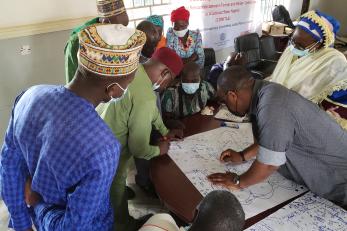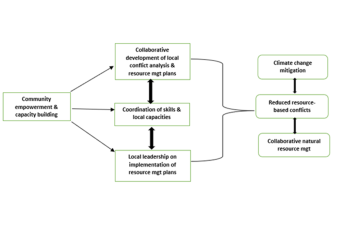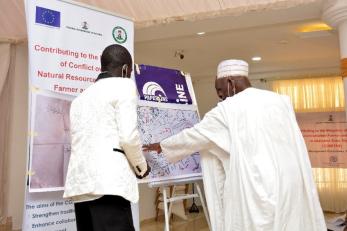Sustaining influence in implementing quick impact projects for peace

As the ongoing COMITAS project in Nigeria’s Adamawa State works to mitigate natural resource conflicts between farmer and herder communities, Mercy Corps is strengthening negotiation capacities of project communities and local authorities to improve actions on collaborative use and management of shared natural resources. Through the application of these negotiation skills, target communities and local authorities are working collaboratively to identify the intersections of influence that exist within each group for improved state-community trust-building, development of community natural resource plans, and prioritization of quick impact projects (QIPs) that can guarantee improved social cohesion between farmer and herder communities.
Following the community-led approach to developing community natural resource plans, Mercy Corps’ team, farmer and herder communities and local authorities are visualizing the complexity of resource-based conflicts. And they collectively identify interdependent actions that will address the conflict drivers in ways that meet the parties' shared interests. Also, besides prioritizing actions that will improve social cohesion and address common problems between farmers and herders, participants demonstrate increased capacity to utilize community agency to raise awareness about, lead, influence, and sustain actions on collaborative resource use and management and climate change. These opportunities demonstrate how empowerment, interdependence, and leadership competencies developed through the COMITAS project is helping communities to lead simple local solutions amid the complex conflicts they face.

What are communities discovering?
- Integrating multiple frames of analysis to resource-based conflicts enhances solutions: Mercy Corps’ COMITAS team and farmer and herder communities are visualizing the relevance of transformational approaches to conflict analysis and negotiation to enable them to see beyond the presenting impacts of resource conflicts. These approaches rely on the ability of resource-based conflict analysis, negotiation, and community action planning to not focus only on proffering rapid solutions but understand the impacts of other [external factors] such as climate change, changing community contexts and relational patterns, and transhumance activities on the natural resource conflicts. By implication, communities are learning, through the community resource action plans, to develop change-oriented initiatives that are responsive to the immediate (short-term) situation and have the potential to facilitate strategic pathways (long-term) towards addressing other drivers of resource conflicts in their communities.
- Communities possess the capacity to live with and respond to the contradictions of resource-based conflicts: Where project communities and local authorities channel their resources for mitigating natural resource conflicts is a function of their prioritized choices, which are mostly influenced by identity bias(es). Contrarily, the natural resource planning sessions empower communities to shift their thinking towards recognizing the legitimacy of shared interests between farmer and herder communities and transform the incompatible energies that fuel resource conflicts. Hence, through the natural resource plans, communities are learning to embrace the paradoxes and dilemmas of resource conflicts yet identifying activities that enable them to respond to various aspects of this complex conflict through different but interdependent initiatives. This reasoning allows target participants to identify key resources—community capacities, leadership, and social connections—that will favor interdependent, rather than contradictory, resource management outcomes for farmer and herder groups.
- Quick Impact Projects (QIPs) will provide solutions and improve the resilience capacities of communities: Although the goal of the community resource plans is to enhance access to and use of shared natural resources between farmer and herder communities, participants are utilizing this process to demonstrate how peace incentive projects will promote the conservation of shared resources, social cohesion, and strengthen inter-communal resilience against external shocks and stresses caused by climate change. In visualizing the untold possibilities of peace incentive projects, farmer and herder communities showcase that they know the solutions that they desire and can transform the drivers of resource conflicts through cross-cutting actions that they lead.

Recommendations for COMITAS and practice
- Integrate conflict analysis as a strategic element of local dialogues: As Mercy Corps supports Natural Resource Management Committees (NRMCs) and other traditional institutions to conduct the local dialogues outlined in their community action plans, each of these meetings should make conflict analysis a central part of the agenda. Collective conflict analysis by farmers and herders will support them to articulate resource-based conflicts more clearly, embrace complexity, build new analysis on previous ones [and those conducted by Mercy Corps’ team], and improve collaborative solutions that enable the building of cross-cutting relationships across deeply divided communities.
- Utilize natural resource management campaigns to encourage communities to embrace diversity: Transforming resource-based conflicts demands that farmer and herder communities access and use reliable information that improves their understanding of conflict patterns and relationships and the roles that diverse actors can play to mitigate resource-based conflicts. By implication, farmer and herder communities must willingly hear and engage voices of identity domiciled within the conflicts – men, women, youths, boys, girls, and elderly. Mercy Corps’ natural resource management awareness-raising activities should, besides other things, emphasize how the diversity of perspectives broadens the methodologies for implementing conflict mitigation solutions.
- Build community resilience capacity: While enormous efforts focus on supporting negotiations to mitigate resource-based conflicts and QIPs, Mercy Corps, through its environmental awareness strategy with the Adamawa State Ministry of Environment, should identify and strengthen the diverse methods and actions by which farmer and herder communities respond to and manage climate change shocks and stressors. Resilience-building efforts demonstrate that communities are aware of climate threats and are positioned to respond in a manner that does not exacerbate tensions.
About COMITAS
Contributing to the mitigation of conflict over natural resources between farmer and herder communities in Adamawa State, Nigeria (COMITAS) also aims to enhance collaboration in managing the use of natural resources. This integrated program is funded by the European Union and is currently being implemented by the International Organization for Migration (IOM), Search for Common Ground, and Mercy Corps.